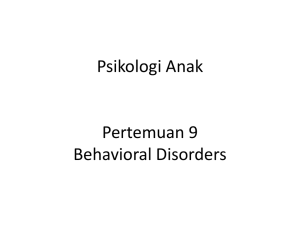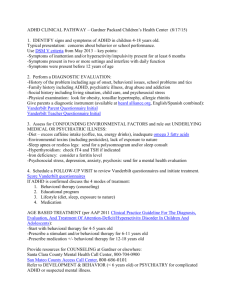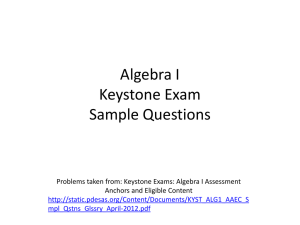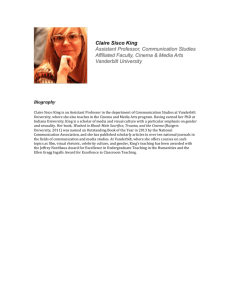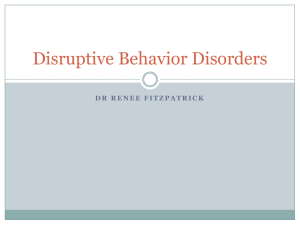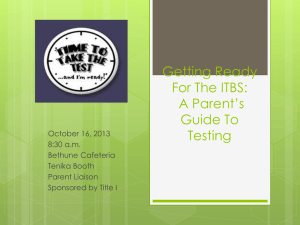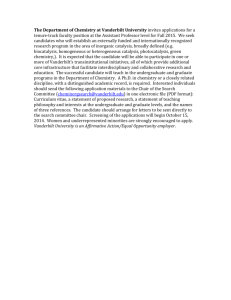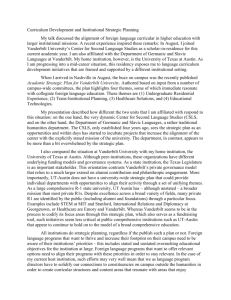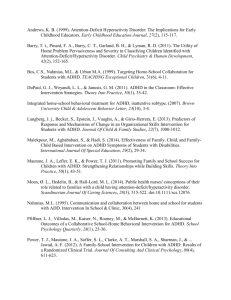RtI 12A - Brownsville Independent School District
advertisement
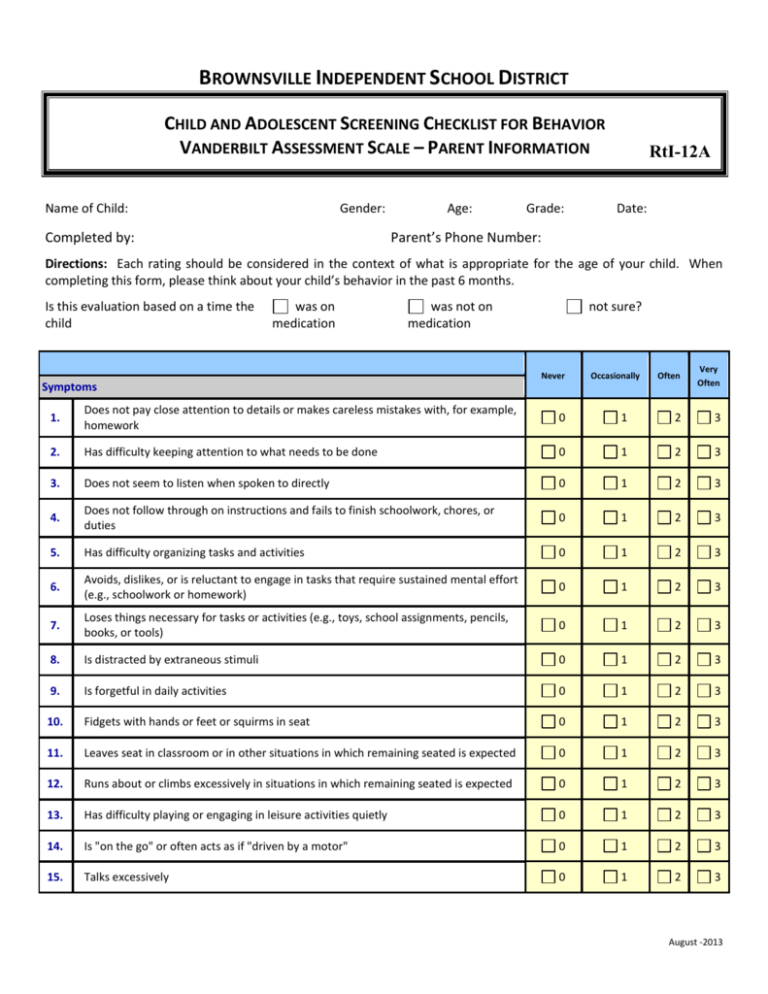
BROWNSVILLE INDEPENDENT SCHOOL DISTRICT CHILD AND ADOLESCENT SCREENING CHECKLIST FOR BEHAVIOR VANDERBILT ASSESSMENT SCALE – PARENT INFORMATION Name of Child: Gender: Completed by: Age: Grade: RtI-12A Date: Parent’s Phone Number: Directions: Each rating should be considered in the context of what is appropriate for the age of your child. When completing this form, please think about your child’s behavior in the past 6 months. Is this evaluation based on a time the child was on medication was not on medication not sure? Never Occasionally Often Very Often Symptoms 1. Does not pay close attention to details or makes careless mistakes with, for example, homework 0 1 2 3 2. Has difficulty keeping attention to what needs to be done 0 1 2 3 3. Does not seem to listen when spoken to directly 0 1 2 3 4. Does not follow through on instructions and fails to finish schoolwork, chores, or duties 0 1 2 3 5. Has difficulty organizing tasks and activities 0 1 2 3 6. Avoids, dislikes, or is reluctant to engage in tasks that require sustained mental effort (e.g., schoolwork or homework) 0 1 2 3 7. Loses things necessary for tasks or activities (e.g., toys, school assignments, pencils, books, or tools) 0 1 2 3 8. Is distracted by extraneous stimuli 0 1 2 3 9. Is forgetful in daily activities 0 1 2 3 10. Fidgets with hands or feet or squirms in seat 0 1 2 3 11. Leaves seat in classroom or in other situations in which remaining seated is expected 0 1 2 3 12. Runs about or climbs excessively in situations in which remaining seated is expected 0 1 2 3 13. Has difficulty playing or engaging in leisure activities quietly 0 1 2 3 14. Is "on the go" or often acts as if "driven by a motor" 0 1 2 3 15. Talks excessively 0 1 2 3 August -2013 16. Blurts out answers before questions have been completed 0 1 2 3 17. Has difficulty waiting in line 0 1 2 3 18. Interrupts or intrudes on others (eg, butts into conversations/games) 0 1 2 3 19. Argues with adults 0 1 2 3 20. Loses temper 0 1 2 3 21. Actively defies or refuses to go along with adult requests or rules 0 1 2 3 22. Deliberately annoys people 0 1 2 3 23. Blames others for his or her mistakes or misbehaviors 0 1 2 3 24. Is touchy or easily annoyed by others 0 1 2 3 25. Is angry or resentful 0 1 2 3 26. Is spiteful and wants to get even 0 1 2 3 27. Bullies, threatens, or intimidates others 0 1 2 3 28. Starts physical fights 0 1 2 3 29. Lies to get out of trouble or to avoid obligations (ie, "cons" others) 0 1 2 3 30. Is truant from school (skips school) without permission 0 1 2 3 31. Is physically cruel to people 0 1 2 3 32. Has stolen things that have value 0 1 2 3 33. Deliberately destroys others' property 0 1 2 3 34. Has used a weapon that can cause serious harm (bat, knife, brick, gun) 0 1 2 3 35. Is physically cruel to animals 0 1 2 3 36. Has deliberately set fires to cause damage 0 1 2 3 37. Has broken into someone else's home, business or car 0 1 2 3 38. Has stayed out at night without permission 0 1 2 3 39. Has run away from home overnight 0 1 2 3 40. Has forced someone into sexual activity 0 1 2 3 41. Is fearful, anxious, or worried 0 1 2 3 August-2013 42. Is afraid to try new things for fear of making mistakes 0 1 2 3 43. Feels worthless or inferior 0 1 2 3 44. Blames self for problems, feels guilty 0 1 2 3 45. Feels lonely, unwanted, or unloved; complains that "no one loves him or her" 0 1 2 3 46. Is sad, unhappy, or depressed 0 1 2 3 47. Is self-conscious or easily embarrassed 0 1 2 3 Performance Academic Performance . Excellent Above Average Average Somewhat of a Problem Problematic 48. Reading 1 2 3 4 5 49. Mathematics 1 2 3 4 5 50. Written expression 1 2 3 4 5 Classroom Behavioral Performance . Excellent Above Average Average Somewhat of a Problem Problematic 51. Relationship with peers 1 2 3 4 5 52. Following directions 1 2 3 4 5 53. Disrupting class 1 2 3 4 5 54. Assignment completion 1 2 3 4 5 55. Organizational skills 1 2 3 4 5 Comments: August -2013 For Office Use Only Total number of items scored 2 or 3 in items 1-9: (ADHD, predominantly inattentive type—6 or more symptoms) Total number of items scored 2 or 3 in items 10-18: symptoms) (ADHD, predominantly hyperactive-impulsive type—6 or more Total number of items scored 2 or 3 for items 1-18: (ADHD, combined type—6 or more symptoms of both types) Total number of items scored 2 or 3 in items 19-26: (oppositional defiant disorder screen—4 or more symptoms) Total number of items scored 2 or 3 in items 27-40: (conduct disorder screen—3 or more symptoms) Total number of items scored 2 or 3 in items 41-47: (anxiety/depression screen—3 or more symptoms) Scoring Instructions for the Vanderbilt Assessment Scale—Parent Informant The Vanderbilt Assessment Scale has two components: symptom assessment and impairment of performance. For the ADHD screen, the symptoms assessment component screens for symptoms that meet the criteria for both inattentive (items 1-9) and hyperactive-impulsive ADHD (items 10-18). To meet DSM-IV criteria for the diagnosis of ADHD, one must have at least 6 responses of "Often" or "Very Often" (scored 2 or 3) to either the 9 inattentive or 9 hyperactive-impulsive items, or both and a score of 4 or 5 on any of the Performance items (48-55). There is a place to record the number of symptoms that meet this criteria in each subgroup. The Vanderbilt Assessment Scale also contains items that screen for 3 other co-morbidities: oppositional defiant disorder, conduct disorder, and anxiety/depression. For the oppositional defiant disorder screen there must be a score of 2 or 3 on 4 of the 8 items (19-26) on the subscale and a score of 4 or 5 on any of the Performance items (48-55). For the conduct disorder screen there must be a score of 2 or 3 on 3 out of the 14 items (27-40) on this subscale and a score of 4 or 5 on any of the Performance items (48-55). For the anxiety/depression screen there must be a score of 2 or 3 on 3 of the 7 items (41-47) and a score of 4 or 5 on any of the Performance items 48-55). The Vanderbilt Assessment Scale should NOT be used alone to make a diagnosis. The practitioner must consider information from other sources. Adapted from the Vanderbilt Rating Scales developed by Mark L. Wolraich, MD. Revised-1102. For additional information about this scale see: Wolraich, M. L., et al. (1998) Obtaining systematic teacher reports of disruptive behavior disorders utilizing DSM-IV. (Diagnostic and Statistical Manual of Mental Disorders, 4th ed.) Journal of Abnormal Child Psychology. Or visit the following website: http://www.findarticles.com/cf_dls/m0902/n2_v26/20824364/p9/article.jhtml?term= This form may be copied by active myADHD.com subscribers. Copyright © 2003 Health Link Systems, Inc. MyADHD.com. August -2013
